
Clinical Psychology Internship
Welcome
Welcome to the digital brochure for the clinical pre-doctoral psychology internship program offered by Regional Health Systems. Here you will find information about the internship program, including internship goals, leadership training, didactic experiences, and more. This page also provides details about the application procedure.
For questions or for more information, contact Valerie Perez, PsyD, HSPP at 219-769-4005.
Southlake Community Mental Health Center, Inc., dba Regional Health Systems
Our clinical pre-doctoral psychology internship program is APA-accredited by the Commission on Accreditation – APPIC Site 1296
Access the trainee admissions, support and outcome data tables, are found in the table below.
More Information
About Regional Health Systems
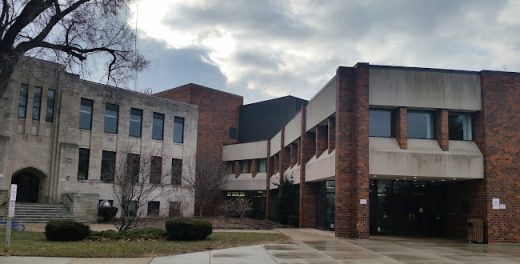
Regional Health Systems is a nonprofit, community mental health center and federally qualified health center providing services in Lake County, Indiana. Regional Health Systems operates 8 locations in Northwest Indiana including two main centers located in Merrillville and East Chicago. These two centers provide mental health care, primary health care and addiction treatment. Most of Regional Health Systems’ locations are within 30-45 miles of downtown Chicago. The Northwest Indiana area we serve is comprised of urban, suburban, and rural areas.
Formerly known as the Southlake Center for Mental Health and Tri-City Community Mental Health Center, Southlake acquired Tri-City on July 1, 2009 to form Regional Mental Health Center—a community mental health center covering most of Lake County. The mental health center opened a federally qualified health center in 2014 to provide primary care to mental health clients. In 2017, the organization changed its name to Regional Health Systems. The agency is still legally known as Southlake Community Mental Health Center, Inc., dba Regional Health Systems. Regional Health Systems treats the whole person, from prevention and child services to adult addictions, mental health, and physical health care. We are coordinated to be a one-stop shop to manage a client’s physical and mental health throughout the life span regardless of their ability to pay.
In 2021, Regional Health Systems became a member of Regional Care Group, a network of human services organizations that includes Regional Health Systems, Geminus Corporation, and Lake Park Residential Care.
Regional Health Systems is fully accredited by the Joint Commission. Regional Health Systems provides a full continuum of mental health care, ranging from inpatient psychiatric hospitalization to outpatient psychiatry and counseling and residential and outpatient addiction treatment, as well as dentistry and primary care health services such as family medicine, pediatrics, and internal medicine. Other services include intensive outpatient programming; outpatient psychotherapy for children, adolescents, adults, couples and families; day treatment, case management, and residential services for the chronically mentally ill; 24-hour emergency services; services for the deaf and hard of hearing; community consultation and education. Regional Health Systems is committed to providing treatment in the least restrictive, most appropriate setting to keep clients within the community and involved in their own recovery. Short-term and evidence-based treatment methods are used whenever possible.
There are close to 450 administrative, support, and clinical staff who are employed at Regional Health Systems. The clinical staff consists of clinical psychologists, psychiatrists, psychiatric social workers, master’s level clinicians, bachelor’s level clinicians, licensed substance abuse counselors, mental health technicians, and peer recovery specialists. In an effort to meet the needs of the community, Regional Health Systems has clinicians and support staff who speak Spanish, given the large population of Spanish-speaking clients, particularly in the East Chicago location. Successful applicants must be committed to working with diverse and underserved community populations.
About the Clinical Psychology Internship
Regional Health Systems has had long-standing clinical psychology internship programs. The APA accredited clinical psychology internship program at Southlake, Regional Health Systems’ preceding organization, was established in 1979; the internship program at Tri-City was established in 1989. The clinical psychology internship program at Southlake Center for Mental Health has been accredited by the American Psychological Association since April 21, 1987, and continues today as Regional Health Systems. Our last APA accreditation site visit occurred in May of 2022, which resulted in Accredited status.
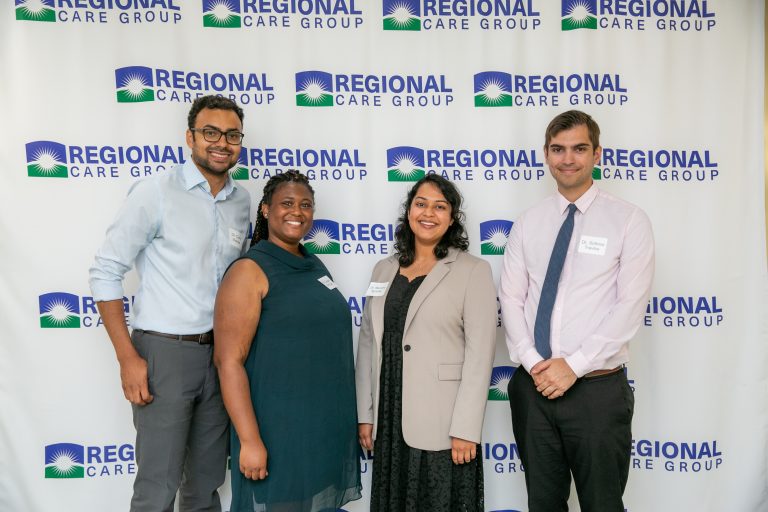
From left: Residents Dr. Cory Mahler, Dr. Dasia McClain, Dr. Manisha Byreddy, Dr. Sotirios Travlos
The primary aim of the internship program is to train competent and ethical clinical psychologists with a particular focus on training psychologists to work in community mental health centers. To accomplish this goal the program was designed to provide an intern with a variety of clinical experiences along with the structure and support of a longstanding institution and a large group of licensed practitioners. The intern gains supervised experience from licensed clinical psychologists and other multidisciplinary staff in a variety of treatment modalities and interventions. These experiences include individual, family and group therapy, case consultation, crisis intervention, and psychological testing.
The internship program can meet the needs of an intern interested in obtaining generalist training in clinical psychology while allowing some flexibility to provide experience in leadership and training opportunities to other agency staff as well members of the community. The program attempts to design a training experience that takes into account the interest and experience of the intern while ensuring that basic training requirements take place. Graduates of the internship have gone on to work in community mental health centers, private practice groups, the VA, and other clinical settings.
The primary model we adhere to within the psychology internship program is the practitioner model of training, which emphasizes the importance of using empirically validated methods of intervention and treatment appropriate to the etiology and symptomatology of the clinical disorders Interns encounter. In following this model, Regional Health Systems’ principal goal is the training of competent and ethical psychologists who will be clinically prepared at the end of the year to work at a significantly elevated level of independence.
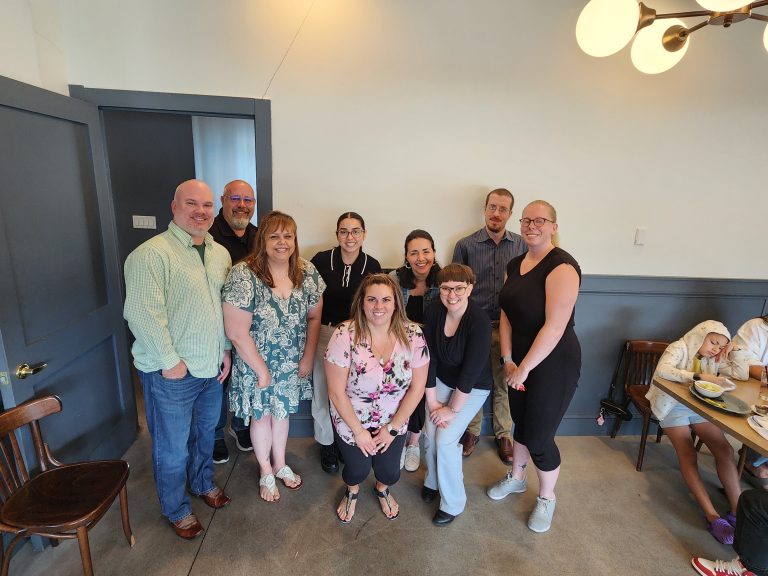
From left: Supervising Psychologist Dr. Jared Eaton, Supervising Psychologist Dr. Brian Dieckmann, Elizabeth Schallack, Julia Alcaraz-Gamez, Rebecca Gold-Stein, Supervising Psychologist Dr. Robert Beedle, Megan Griesel Front: Director of Training Dr. Valerie Perez, Madeleine Lane
The internship consists of a minimum of 2,000 hours completed within one year. Approximately 20 hours of the intern’s time each week will be spent in direct service to Regional Health Systems’ clients. Direct clinical contact will occur each week in two settings: Interns are assigned to one of three outpatient offices and carry a therapy caseload in that program for 12 months. Each intern also completes several psychological test batteries during the internship year; this has varied greatly in the last several years and was negatively impacted by the COVID-19 crisis. Leadership Training activities will be available throughout the year. The intern will provide weekly peer supervision to more junior staff and students (such as psychology externs, master’s level students, etc.). Additionally, interns will create and present lectures (based on a psychology curriculum) to help train psychiatry residents, and other staff, topics that will aid staff in their work with the clients they see at Regional. This aspect of the internship may change and evolve as unique opportunities for our interns continue to develop. Leadership Training activities will be available throughout the year. The intern will provide weekly peer supervision to more junior staff and students (such as psychology externs, master’s level students, etc.). Additionally, interns will create and present lectures (based on a psychology curriculum) to help train psychiatry residents, and other staff, topics that will aid staff in their work with the clients they see at Regional. This aspect of the internship may change and evolve as unique opportunities for our interns continue to develop.
- Interns receive at least two hours of individual face-to-face or video conferencing, formal supervision per week for clinical work and assessment batteries.
- One hour of group supervision focuses on training on supervision to review theory, practice, and review their provision of peer supervision to the externs and master’s level trainees.
- They also participate in case conferences, agency training and in-service trainings.
- Interns attend weekly seminars in psychotherapy and psychological assessment as well as participate in Journal Club and Diversity Journal Club.
- A weekly wellness hour is available so that interns can share their experiences; try out new self-care/relaxation/mindfulness activities and connect with other staff members.
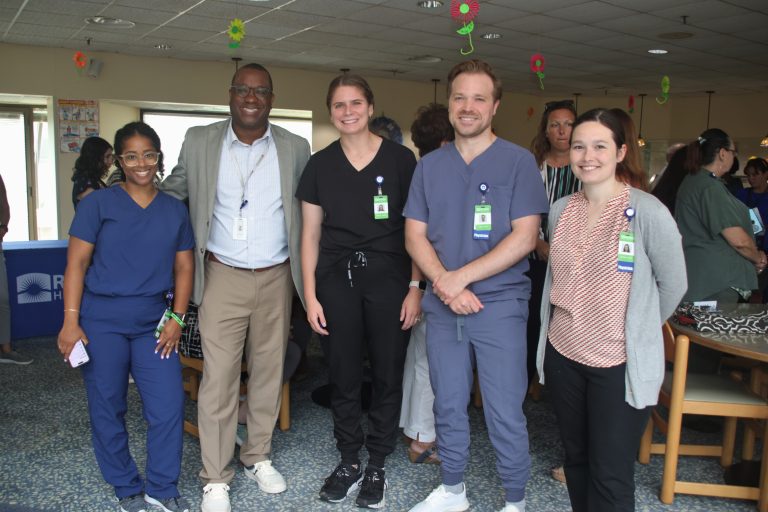
From left: Resident Dr. Chantae Hollis, Chief Medical Officer Dr. Kobie Douglas, Residents Dr. Angelina Hiestand, Dr. Anders Bailey, Dr. Mallorie Cullers
Graduates of the internship are expected to be proficient in psychological assessment and the use of a variety of assessment instruments including various Wechsler instruments, Rorschach (R-PAS), Projective Drawings, various MMPI and Millon personality inventories, various achievement instruments, and other survey questionnaires for behavioral and emotional evaluation. We also have the ability to do Autism assessments and assess adaptive and executive functioning.
Interns are expected to achieve competencies in clinical interviewing, treatment, individual therapy, family therapy, and crisis intervention. Interns learn to work with severe and persistent mentally ill clients, and may also encounter opportunities to work with substance abuse clients, persons currently on a psychiatric inpatient unit, as well as children and adolescents. By the end of the academic year, interns should be comfortable doing psychotherapy and psychological testing with a diverse population, diagnostically and demographically, who may have multiple physical and emotional concerns.
The theoretical orientation of the training staff varies considerably. However, some of the training staff employs a psychodynamic conceptual model and a short-term, eclectic intervention model, while others rely more on cognitive-behavioral as well as systems perspectives. Some are trained in CPT and motivational interviewing. All psychology staff members are proficient as “generalists” in terms of population and, as such, tend to be largely flexible in their theoretical and treatment approaches. Supervisors will inform the interns of their scope of practice and complete a more structured supervision contract following orientation at the agency.
Internship Aims
Aim 1:
To prepare interns to function as competent and ethical entry-level generalist practitioners with the requisite knowledge and skills for practice of professional psychology.
Objectives include: developing awareness, understanding and application of research to practice, management of ethical issues, to increase awareness and sensitivity to Individual and cultural diversity, and be self-reflective, learning professional values and attitudes, good communication and interpersonal skills with clients but also with other staff, performing competent assessments and appropriate psychotherapy interventions, have initial supervision experiences in peer supervision.
Aim 2:
To prepare interns to function as generalist practitioners in a community mental health center and/or other public mental health setting, including the exploration of the varied aspects of a multidisciplinary treatment agency.
Objectives include: To provide evidence-based interventions in an ethical manner in an outpatient community mental health environment. Begin to learn and practice supervision skills, provide peer supervision skills, provide peer supervision to externs, treatment collaboration and consultation for exposure to different disciplines and treatment modalities, to display competent incorporation of cultural competency issues as applicable to clientele of agency and to employ positive communication and interpersonal skills with multidisciplinary staff and clients, as well as developing healthy stress management and trauma stewardship while conveying professional values and attitudes.
Competencies evaluated will fall under the following areas:
-
Research
-
Ethical and Legal Issues
-
Individual and Cultural Diversity
-
Professional Values and Attitudes
-
Communication and Interpersonal Skills
-
Assessment
-
Intervention
-
Supervision
-
Consultation and Interprofessional/Interdisciplinary Skills
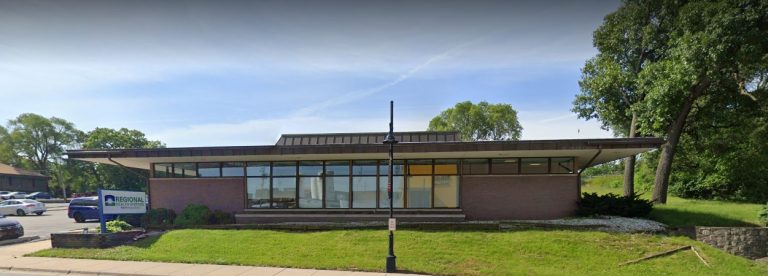
Outpatient Placements
The emphasis in the outpatient offices is to provide high-quality, short-term mental health evaluation and treatment services. The outpatient offices serve clients in the local area, as well as from several HMO, EAP, and managed care contracts. There are two outpatient offices where interns will be located: the Stark Center in East Chicago, Indiana and Lakeside in Highland, Indiana. Interns provided some services by telehealth but most clinical work is completed in person.
The 12-month outpatient placement provides a variety of clinical experiences with children, adolescents, and adults. These experiences include psychotherapy (individual, marital, family and group), crisis intervention, case consultation, and psychological testing. Interns are involved in all aspects of the treatment process from intake assessment through termination. The expectation is that each intern will complete at least 500 clinical contact hours of outpatient experience throughout the year. Some of these hours may include consultation and education within the community, such as co-leading groups or workshops, and addressing community groups. Each intern also is expected to complete a number of psychological testing batteries during the year, which will also be included in total contact hours, the number of testing cases will vary. Referrals for psychological testing are received from outside agencies and from the various treatment programs of Regional Health Systems.
Leadership Training
A note about this aspect of training:
Additional training activities may be added or eliminated due to unforeseen changes. Every effort is made to add or create additional opportunities if needed to suit the learning goals of the interns.
As previously mentioned, interns will provide weekly peer supervision to more junior staff and students (such as psychology externs, master’s level students, etc.). Additionally, interns will create and present 2-hour long lectures (based on a psychology curriculum) to help train a group of psychiatry residents foundational psychology topics that will aid the residents in their work with the clients they see at Regional. Topics may include Cultural Humility, Trauma Stewardship, Lifespan/ Development, and various Evidenced based treatments/interventions. Finally, interns will also participate in NILEA (Northwest Indiana Law Enforcement Academy) training. Interns present mental health topics (such as: Substance abuse, psychosis, mental health first aid, autism, suicide, etc.) to incoming police cadets to fulfill their annual certification requirements. This aspect of the internship may change and evolve as unique opportunities for our interns continue to develop.
All interns have opportunities throughout the year to provide consultation to other staff, collaterals, and outside professionals as part of psychotherapy, assessment, and leadership training. The interns are expected to develop and deliver multiple presentations throughout the training year. This might be an in-house presentation, for example, to the psychiatry residents or to an outside community or professional audience as well. Examples of this type of presentation might include a feedback session to a client who has been psychologically tested and/or discussing the diagnosis and recommendations with their therapist or psychiatrist to aid in the treatment of that client. The interns’ participation in events like NILEA is another example.

Supervision
Supervision is a core element of the internship program. Supervisors provide support, mentoring, and guidance throughout the internship year. This is accomplished through feedback, problem-solving, affirmation, and functioning as role modeling for the interns. The supervisory relationships help the Intern develop a professional identity and increased competence for independent functioning. Each Intern receives at least four hours of formal supervision every week. Each intern receives a minimum of two hours of supervision by a licensed psychologist. Each Intern participates in at least one hour of weekly group supervision. Additional supervision may be in the form of group, individual or specialized training led by experienced staff, who are appropriately credentialed health care providers.
Didactic Experiences, Seminars and Other Meetings
Interns attend weekly seminars with various topics throughout the year.
Seminars are led by a multidisciplinary team of psychologists, social workers, psychiatrists, and other professionals. Approximately 10 different staff members and invited speakers take part in this training series throughout the year. The emphasis in the seminar series is on teaching competent and ethical practice within a community mental health setting. Previous topics have included: assessment considerations, Diversity issues, grief, substance abuse treatment, preventing burn-out and accessing community resources. Seminars are currently held weekly on Wednesdays from 9 a.m. to 12 p.m.
Interns also participate in a Journal Club which is incorporated into the seminar schedule with a member of the psychology staff. Each Intern is responsible for selecting articles and facilitating informal discussion for one Journal Club meeting.
The Diversity Journal Club occurs during the year with each Intern facilitating a discussion about an article with their peers. This is an opportunity to explore the range of diversity issues that present in a community mental health setting. Recent topics of our journal clubs have included: Indigenous Psychology, Psychology of body diversity, Cognitive processing with Bilingual Clients, Attachment and Aging, and Psychotherapy, Classism, and the underserved.
The Interns’ Wellness Group is a self-care, wellness and process group that allows the interns to socialize, try to use new self-care or mindfulness exercises, or provide peer support if needed. This typically occurs at least once per week for one hour.
Interns may also participate in clinical staffing, and at least once a month in general business meetings with the outpatient staff and outpatient supervisors.
Interns will each present on two occasions throughout the year at case conferences that occur during the Wednesday morning seminar meetings. This is a ninety-minute forum in which trainees take turns preparing and providing case presentations utilizing their active client caseload. The focus of the training includes case conceptualization, diagnosis, case management, and clinical intervention. Participants will receive assistance with clinical and theoretical skills, as well as general supervision from the case conference leader and other group members. Coordination of an article associated with some aspect of the case is incorporated in this discussion. Each intern will present two cases during the year. At the end of the internship, each intern will complete a full case conceptualization of a client for presentation to committee members with related articles, for a final case presentation.
STAFF DEVELOPMENT
Regional Health Systems has an active staff development program for its employees. As employees of the agency, interns have the opportunity to attend these in-house training events. Previous in-house training events have covered the following topics: the assessment and treatment of ADHD, Tiered Military Training providing by Star Behavioral Health, Sleep Hygiene, Motivational Interviewing, LGBTQI+ treatment, PTSD treatment, and family therapy for sexually abused clients. Interns will also have access to Conference Days and financial support to attend trainings that occur outside of the agency.
INTERN FEEDBACK
To facilitate ongoing professional and personal growth, interns are given formal feedback throughout the course of the internship year. The formal feedback occurs two times a year. The evaluation sessions are coordinated by the outpatient therapy and testing supervisors. Rotation supervisors provide evaluations specific to the competencies for each rotation. Group supervision supervisors also have input into the evaluations. Interns are shown the feedback form as part of the orientation process at the beginning of the year. The evaluation procedure includes verbal processing of the evaluation with an opportunity for the intern to address strengths seen, areas in need of further development, and comments by the intern.
SUPERVISOR FEEDBACK
To facilitate ongoing improvement in the quality of supervision on the internship, supervisors receive formal feedback from the interns. Efforts are made by supervisors to provide an opportunity for informal feedback to and from the interns on an ongoing basis. The outpatient therapy supervisor, the outpatient testing supervisor, and and group supervisors each receive this feedback twice a year before the internship is completed. Interns are shown the supervisor feedback form as a part of the orientation process at the beginning of the year.
INTERNSHIP FEEDBACK
To facilitate improvement in the overall quality of the internship, interns are asked to provide feedback on all internship components at six months and at the end of the internship year. These feedback forms are filled out anonymously. They are examined closely by the Training Committee and have often served as a springboard for positive modifications to the Internship.
TRAINING COMMITTEE
The psychology training committee is composed of all psychologists involved in the training of interns and a few administrators who oversee the Internship Program. The committee’s purpose is to solicit feedback from supervisors and further enhance the training of interns. All members will be involved in self-study development, intern supervision, and program development. The training committee meets once per quarter. It is chaired by the director of training. The committee strives to secure a high level of quality in every component of the Internship. The director of training has overall responsibility for the integrity and the quality of the internship.
Time Commitment
The time that previous interns have reported spending on the internship has varied considerably. The reported range is approximately 40 hours per week. The time commitment appears to depend on variables such as the intern’s interest in gaining additional opportunities for training, the intern’s level of experience, developing skills from outside research and reading (i.e. increasing competency with Rorschach administration, scoring, and interpretation), and the development of time management skills to maintain the responsibilities of the internship.
Although we have flexible work weeks, schedules are organized around regularly scheduled meetings and some required evening hours (at least six hours of availability after 5 p.m. per week); this is to accommodate the school and work schedules of our clients. It is standard for interns to work at least two evenings a week until 8 p.m.
The following time breakdown may be helpful in achieving a sense of time commitment:
- Clinical contact hours | 500 total per year (both testing and therapy)
- Outpatient testing | Testing hours may very on the case and continued interest of the intern in gaining assessment proficiency. Approximately 5 batteries expected.
- Outpatient Supervision | 4 hours a week/2 individual; 2 group
- Seminars/Didactics | 3 hours a week
- Intern Wellness Group | 1 hour a week
- Leadership Training | 4-6 hours a week
- Paperwork | Varies per intern and task
- Travel time between sites | 20-30 minutes
Psychology Training Committee
Robert Beedle, Ph.D. (Illinois Institute of Technology) Post Doctoral Staff, QI Rotation Supervisor. Areas of Interest: Diagnosis and Treatment of Autism, Pain Management and Rehabilitation Psychology.
Angela Comsa, M.S.W. (Indiana University/Purdue University Indianapolis) Vice President/Chief Clinical Officer. Areas of Interest: Child therapy, Training and Education, and Administration.
Brian Dieckmann, Psy. D. (Chicago School of Professional Psychology). Supervising Psychologist, Emergency Services Director; Areas of Interest: Health Psychology, Stress Management, Trauma, Addictions, and Crisis Management.
Jared Eaton, Psy.D. (Chicago School of Professional Psychology). Supervising Psychologist, Rapid Resolution Therapy Practitioner; Areas of Interest: Adult and Adolescent therapy, PTSD, Anxiety, Depression, and Panic Attacks.
Angela Erb, MSW, LCAC. (Aurora University). Clinical Service Director. Administrative Supervisor, Previous Outpatient Service Director. Areas of Interest: Addictions, Federal Probation and Veteran’s Services.
Sharon Kraus, Ph.D. (SUNY at Buffalo). Former President and current part-time Consultant. Areas of Interest: Family therapy, marital therapy, mental health administration, and program evaluation research.
Valerie Perez, Psy. D. (Chicago School of Professional Psychology). Director of Training and Supervising Psychologist; Diversity Journal Club, Supervision Group Therapy, Pre-surgical Bariatric Evaluations. Areas of Interest: Disordered eating, Supervisory Training, Anxiety, Trauma, Self-Care and Relaxation, Feminist Theory
William Trowbridge, J.D. (Valparaiso University) Chief Executive Officer, Regional Care Group. Areas of Interest: Health care administration and Human services, Organizational and leadership development, Training and Education.
Compensation & Benefits
The stipend is $33,000 for the year. Interns are provided 160 paid time off hours; however, 2000 hours of work are required to complete the internship program. The agency reimburses, at the average rate of 67 cents/mile (changes with the national average), for work-related travel expenses. Regional Health Systems also pays for malpractice insurance and life insurance. Interns may participate in the agency’s health and dental insurance plans. Interns have access to free short-term psychotherapy through the agency’s EAP for up to six sessions.
The agency maintains a drug-free workplace. Employment is contingent upon a pre-employment drug test, fingerprint and background check on or before the start date.
Prerequisite Requirements
The intern will be expected to have completed all academic work in clinical/counseling psychology at the doctoral level, as well as all practice or externships and qualifying examinations, as required in their particular doctoral program. A minimum of 500 total intervention hours is necessary to start the internship program i.e., needing 500 accrued by the start of the internship. Those not meeting minimum hours due to the COVID-19 pandemic will be considered on the basis of their overall qualifications and goodness of fit with Regional Health Systems’ goals, services and population.
Regional Health Systems is funded for four intern positions for the 2025-2026 year. Regional Health Systems is an equal opportunity employer and service provider. Academic training in an APA-accredited doctoral program is required. Minority applicants, and Spanish-speaking, and culturally aware applicants are strongly encouraged to apply, along with individuals interested in working with underserved individuals. Applicants are expected to have previous experience treating children and adolescents in family therapy or be willing and interested in learning this modality of treatment. Prior experience working in a community mental health center setting is a priority for the internship program.
RESEARCH
While the training mission of the internship is clinical in nature, every possible opportunity is taken to utilize and to underscore the importance of research. The seminar series incorporates up-to-date research. Individual and group supervisors employ research findings in teaching assessment and intervention methods. Available resources and the clinical mission of the agency do not allow the implementation of an ongoing research agenda. As noted above, the Leadership training aspect is one opportunity for research potential, and consultation skills are taught and additional educational opportunities are available throughout the year. The creation of a training didactic or presentation to the larger agency is possible as part of the leadership training.
Miscellaneous Information
OFFICE SPACE
Interns will have office space available to them both at their main outpatient location. All interns will have their own private office, phone and desktop computer.
SUPPORT SERVICES
Each outpatient and rotation site has designated office staff. These administrative assistants are available to interns for general office services, including sending letters to clients, sending faxes, maintaining reports, etc. All billing for clients is handled by financial offices in each location and the Regional Care Group, which manages Regional Health Systems’ human resources, billing and some agency-wide training concerns.
Interns have full and equal access to agency equipment (e.g., photocopiers and audio-visual equipment). A personal computer workstation with intra- and Internet connectivity is assigned to each Intern in order for them to utilize our electronic clinical record if they are working in the office. Interns will have access to testing equipment. The executive assistant for the internship helps interns access equipment and aid scoring test batteries. Each outpatient and rotation site has a kitchen area complete with cooking appliances and storage.
ELECTRONIC RECORDS
Regional Health Systems has electronic medical records for all clients and all services provided. Interns are trained in the use of these records during the orientation process as well as ongoing during the internship year. Supervisors regularly review medical records and form completion; chart audits are completed several times a year to ensure accurate use of the electronic record. We may continue to provide some limited teletherapy services, but services are mainly in person at this time. Interns may have to use their own laptops to access teleconferencing and Microsoft 360. If working at home continues, a connection to the computer system and electronic health record will be provided by Regional Health Systems but may require downloading software on your personal laptop.
All intern files are kept on paper and digitally, password protected in a shared drive with limited access. Email communication regarding interns and communication with their school is also saved in the electronic files.
PARKING
There is ample, accessible, free parking available at all RHS facilities.
Application Procedure
Students wishing to apply for the internship program should provide the following:
- APPIC application form
- Three letters of reference
- Sample test report
- Transcripts of all graduate coursework
- Curriculum vitae
Application due date
All information must be received by midnight Central Time on December 5, 2024.
Where to submit your application
New APPIC requirements state that all applications must be submitted through AAPI online. This can be accessed at www.appic.org, then clicking on the “AAPI Online.”
Please note that Regional Health Systems also requires a Sample Test Report as part of the application materials. The report can be uploaded and attached to your electronic application.
Please do not send any data via US Mail.
If you have any questions regarding the application process, please contact Dr. Valerie Perez at valerie.perez@rhs.care.
Interviews
Interviews will be conducted virtually by video conferencing. Interviews will continue to include an information section and interview with supervisors as well as review of a case study.
Selection process
The selection process will proceed in accordance with APPIC’s published guidelines. This internship site agrees to abide by the APPIC policy that no person at this training facility will solicit, accept, or use any ranking-related information from any intern applicant.
Match info
Regional Health Systems’ (formerly Regional Mental Health Center) matching program code number is 1296.
Register for the NMS match at https://natmatch.com/psychint/
See the APPIC website for more information regarding the match: http://www.appic.org/match/5_3_match_application.html
Accreditation questions
Southlake Community Mental Health Center, Inc, doing business as Regional Health Systems is currently an APA-accredited internship program. If you have any questions regarding accreditation, the Commission on Accreditation can be reached at (202) 336-5979. The address is as follows: 750 First Street NE, Washington, DC 20002-4242 Telephone: 800-374-2721; 202-336-5500. TDD/TTY: 202-336-6123
